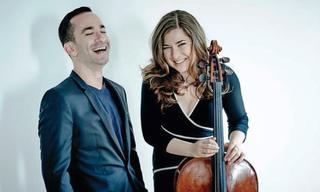|
Back
Excitement and Exuberance New York
Zankel Hall,Carnegie Hall
10/17/2017 -
Felix Mendelssohn: Cello Sonata No. 2 in D major, Opus 58
Benjamin Britten: Cello Sonata in C Major, Opus 65
Steven Mackey: Through Your Fingers (World Premiere)
Sergei Rachmaninoff: Cello Sonata in G Minor, Opus 19
Alisa Weilerstein (Cellist), Inon Barnatan (Piano)

I. Barnatan, A. Weilerstein (© Opus 3 Artists)
“I did a film of me reading hate mail, with a woman playing cello in the background.”
Scientist Richard Dawkins
Had those first breathtaking ten seconds of this recital carried on for the next two hours, Alisa Weilerstein and Inon Barnatan would have offered a most memorable evening. And surprise!. (Or no surprise at all). They did. It was.
As for that italicized quote above, after this recital, my ears, mind and spirit felt so damned elated that any “serious” cello quote would be depressing.
This duo is already world-renowned, individually and in partnership. So whatever they had chosen would have attracted a sell-out crowd. In this case, the duo elected to respect their Zankel Hall audience by performing four big substantial works, none of those sweet little pieces so frequent in a recital of this sort., That was a lot of cello for an evening, but Ms. Weilerstein’s musical temperament never waned. Moreover, she is less in the Yo-Yo/DuPre beautiful vein, more in the Rostropovich school :“Let the explosions come where they may. This is my party, and if it’s too incendiary, too damned bad.”
As for Mr. Barnatan, more on him later. He was not–in fact, never–an accompanist. He was catalyst, performer, absolute equal to his partner.
The shock of that explosive opening was that the composer was Felix Mendelssohn. This was not the placid Mendelssohn of elegance and Victorian picnics. His opening Allegro assai vivace had no introduction at all. The duo barely took their seats when both flew into action. One expected refinement, but what these two offered was almost ruthlessly passionate. Yes, there were times when Mr. Barnatan’s arpeggios overwhelmed the cellist. Yet again one must realize that he was always the collaborator, never the servant.
That second movement came close to the elvish Mendelssohn we all know (albeit with great humor). But the Adagio was played with more than grace. Mr. Barnatan took the opening chorale-like “song without words” with a Bach-like severity, and Ms. Weilerstein answered with the appropriate intensity.
And for those of us (like myself) who tend to put Mendelssohn into an exquisite jewel-box, the Weilerstein/Barnatan made that jewelry box burst open.
The following Britten C Major Sonata has a few difficulties, the major one being Mstislav Rostropovich, more than dedicatee, was as spiritually and musically an outgrowth of the composer. (Another cellist playing this would be like a non-Brando acting out Stanley Kowalski). Second is that this five-movement work has a simple enough exterior–but the complexities internally are diabolic.
Yet these two, plunging ahead in the clever fast movements, and somberly playing the elegy, gave it a veneer which, even at its most puzzling, seemed accessible. Part of that was because both Ms. Weilerstein and Mr. Barnatan were deep into the actual humor of the work.
Not only the moto perpetuo finale, but the clever hidden homages to Rostropovich. One could feel it in the second movement, with the Russian measures, and one knew it in the fourth movement with... What was that march? Of course! It was a Tchaikovsky-style march.
Neither Britten nor this duo had to push it, had to musically “explain” those homages. Nor did they have to push Britten’s expanded cello vocalisms, the glissandi, the pushing against the wood, the strange measures without vibrato.
And once again, nobody had to regret Mr. Barnatan’s piano virtuosity while Ms. Weilerstein was playing simple melodies. Britten was a wondrous pianist, and he never hesitated to show it. Barnatan is in the same category, and it was a pleasure to hear him take over the partnership.
The one premiere, co-commissioned by Carnegie Hall, was Stephen Mackey’s Through Your Fingers. Mr. Mackey never “graduated” from rock music to becoming Chair of the Princeton University’s Music Department. Like a dedicated art collector, he has taken rock, jazz, pop and “classical” music, he can pick and choose what he needs–and this is exactly what he did in this 17-minute work.
The styles were easy enough. He went from complex cells and melodies, to jazzy Art Tatum work on the piano, He offered chords and wind chimes. He went from enigmatic semi-themes to glorious Romantic melodies (the stuff which Rachmaninoff would use in the final work). The opening chords were repeated almost at the end, but he then sailed through with even more material.
In fact, he was so inventive, he offered so much material, that one was frequently confused–but no less elated! Following the threads through such a fabric was hardly easy (though it seemed simple enough for the performers), but one knew that Mr. Mackey was aware of the puzzles and was all too enthusiastic to show them to us.
The last work was the longest. Rachmaninoff’s Cello Sonata. It was written about the same year as the Second Piano Concerto, with the same torrential, long-breathing tunes, with the same joy in contrasts (Ms. Weilerstein on the lowest register, Mr. Barnatan easily taking the trills and rich harmonies). All three movements were played with exuberance–never bombast–and that finale rose with affirmation by both artists.
Along with an encore from the Chopin Cello Sonata, it was evident why these two performers are made for each other. Not once did one have to think about the beauties of Ms. Weilerstein’s cello or Mr. Barnatan’s Steinway. They were playing the music, not playing for themselves. The result was not so much individual brilliance as a freshness and, even in the most stolid slow movements, a rare exuberance.
Harry Rolnick
|